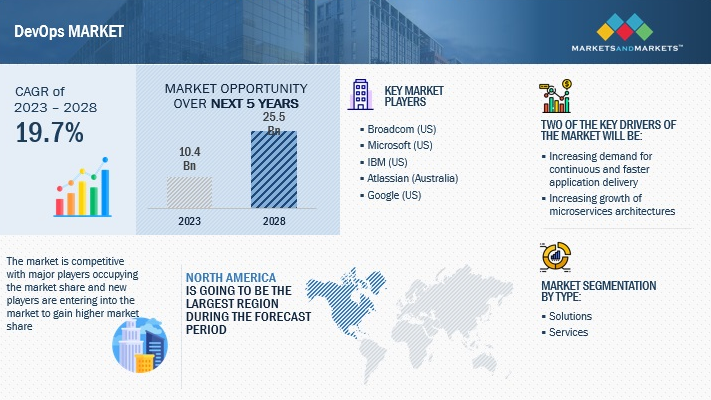
Healthcare has embraced electronic methods for delivering services. Patient information is shared securely through electronic platforms. Significant healthcare organizations and hospitals now offer complete medical records and medication services through telemedicine and customized health technology solutions.
Patients can also use applications to book appointments, pay fees in advance, and share reports online before visiting the hospital.
To create a high-level electronic healthcare ecosystem, a healthcare organization simply needs to implement DevOps in the development processes of healthcare applications.
The DevOps market will grow to $25.5 billion by 2028 on a global scale. Healthcare technology companies and providers are actively searching for the most effective strategies to define, implement, and fully leverage the advantages of DevOps in the healthcare industry.

Source: Marketandmarkets
Implementing DevOps strategies into the SDLC processes of healthcare app development increases the velocity of software development, thus guiding the creation of higher-quality digital products.
Challenges Faced in the Healthcare IT Domain
Some difficulties that have arisen from the combination of electronic communication and information sharing in healthcare include ensuring different systems can work together, adhering to regulations, and protecting data and infrastructure.
1. Security Compliance
In the healthcare IT industry, ensuring security and compliance is extremely important, especially when using advanced algorithms in diagnostic software and patient management systems.
The sensitive nature of patient information requires strong security measures to protect against cyber threats. Encryption, access controls, and secure data storage are essential components of IT infrastructure. Additionally, adhering to industry standards and regulations is closely connected to maintaining security.
2. Complex Integration
The use of complex algorithms in diagnostic software, patient management systems, and telehealth solutions presents difficulties in terms of compatibility. Healthcare systems typically have various technologies and ensuring smooth communication is a significant challenge.
Moreover, large volumes of sensitive patient data produced by these solutions require a robust infrastructure for securely handling storage, processing, and transmission. The requirement for instant data exchange further complicates the IT structure.
3. Regulatory considerations
Regulatory factors are necessary in diagnostic software and patient management systems. Government bodies and regulatory agencies have strict guidelines to ensure that healthcare technologies are safe and effective.
Organizations must comply with regulations like HIPAA, as these algorithms handle sensitive patient data. The constantly changing healthcare regulations make it mandatory for organizations to be flexible and adapt their IT systems to remain compliant.
Creating a Roadmap for Implementing DevOps in Healthcare
Strategic planning for implementing DevOps is crucial because precision and reliability are crucial when deploying complex algorithms in diagnostic software, patient management systems, and telehealth solutions. Let’s go through them.
1. Analyzing present infrastructure
Healthcare organizations won’t be able to start a DevOps project unless they have evaluated their current IT infrastructure. A review of the current technologies, processes, and systems is part of it.
The evaluation should address the degree to which the existing infrastructure is compatible with DevOps methods in terms of sophisticated algorithms.
By understanding the strengths and weaknesses of the current setup, healthcare organizations can implement DevOps in a targeted and successful manner, ensuring smooth integration with their IT systems.
2. Stakeholder identification and Cross-Functional team formation
The success of DevOps in the healthcare industry depends on strong stakeholder engagement and communication. Determining who these stakeholders are, from IT specialists to medical professionals, is an essential first step.
Putting people with different areas of expertise together in cross-functional teams guarantees a comprehensive approach to DevOps implementation. While working with complicated algorithms, data scientists, developers, and healthcare domain experts must be included in these teams.
3. Setting up goals and standards
When implementing healthcare DevOps, having well-defined objectives and standards is essential. Establishing SMART goals–specific, measurable, realistic, relevant, and time-bound assures that the implementation lies within the overall aims of preserving reliability and improving algorithmic accuracy.
Healthcare firms can monitor their progress and assess the efficacy of the DevOps deployment by using benchmarks as milestones.
Advantages of Executing DevOps in Healthcare
The application of DevOps in the healthcare industry has several significant advantages that transform how businesses run and provide healthcare services.
1. Quicker Development Cycles
The lengthy development cycles in the healthcare industry are accelerated using DevOps. Rapid and dependable software solution deployment is provided by the combination of automation tools and continuous integration/continuous deployment (CI/CD) methodologies.
Shorter development cycles help firms keep ahead of technology, roll out changes quickly, and react fast to new healthcare concerns in a healthcare environment where timely delivery of innovations is crucial.
2. Effective Use of Resources
Within healthcare businesses, DevOps enhances resource use. Healthcare workers can effectively manage their time and expertise by automating repetitive tasks, optimizing workflows, and reducing manual interventions.
This efficiency also applies to the use of infrastructure, guaranteeing that resources are distributed in a way that is responsive to demand. As a result, the healthcare IT environment uses resources as efficiently as possible, which lowers costs and improves overall operational performance.
3. Enhanced Cooperation
When DevOps is used in the healthcare sector, cooperation between the development and operations teams is encouraged. Communication routes are streamlined and organizational silos are dismantled to facilitate seamless collaboration.
Better collaboration ensures that stakeholders from all walks of life work together to achieve common goals, which increases the efficiency and efficacy of healthcare IT projects. As a result, the healthcare ecosystem is now more agile and responsive, able to quickly adapt to the shifting needs of patients and practitioners.
Conclusion
Implementing custom healthcare software development for the healthcare industry using DevOps is a wise approach to address current problems. There is a lot of demand in the healthcare sector to respond while maintaining security and integrity.
By decreasing downtime and maximizing access to healthcare, this strategy can assist medical organizations in providing better treatment. Going digital is the way to go, and adopting DevOps is a positive step toward dependable and effective patient care.